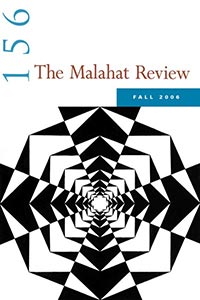Issues
Our Back Pages
Issue #156
Issue Date: Fall 2006
Editor: John Barton
Pages: 112
Number of contributors: 22
Buy Issue 156: Print Edition

If you’ve not heard of Norway’s “Slow TV” you have something to look forward to. It is just what it sounds like: a kind of antidote to the swiftness of modern social media. Slow TV takes its time. There is a program called “National Knitting Night” which features people knitting for thirteen hours, and there is an eighteen-hour eponymous show called, “Salmon Swimming Upstream.”
I’m thinking about Slow TV because I have unfettered access to the Malahat backlist and it’s a similar kind of pleasure to me to take an issue from several years ago (in this case #156 from 2006) and spend a whole afternoon reading in a summer chair by the river. In 2018, the simple act of being outdoors and reading for hours seems to me a great privilege. It’s a way of leaving behind the frantic communications of my screens and, like Slow TV, just being for a while, but with a kind of concentrated focus on some wonderful writing.
Among the gifts in this issue is P. K. Page’s story, “A Biography of You.” The issue bears a special dedication to P. K. because it was her 90th birthday in the fall of 2006. She is much better known for her poetry and her visual art, but Page wrote fiction all through her career and this story about a troubled and troubling guest shows that she was skillful in prose as well.
There is a long story called “Bee Girl” by American writer Steven Hayward, which is an excellent example of the way a strong character (Tallulah, in this story) and an imaginative setting (an apiary at a farm park) can drive a powerful narrative forward.
The issue opens with a story by Pasha Malla. “Respite” is about a writer named “Womack” who is also the part-time caregiver for a boy who “is twelve, and dying of a degenerative illness.” The story takes the reader deeply into their world and it’s a pleasure to spend some time there.
There are poems by Anne Szumigalski, Jen Bills, Rhonda Douglas, Brian Day, and Marilyn Gear Pilling. Evelyn Lau’s poem, “Tarantula” has sharp teeth; Steve Noyes’ poem, “Owl and the Unborn” is a meditation on loss; and Linda Rogers’ “We Get to the End” peels off layers of emotion to get to the heart of it. There are also two poems by Carla Funk: “The Banning of Beauty” imagines a different way of peeling away layers, and “Winter Night: Voyeur” cools down our dreams.
— Jay Ruzesky









